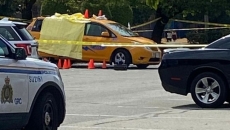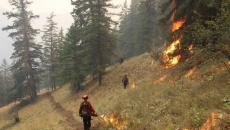1. Tell us a little bit about yourself?
I have been practising at Surrey Memorial Hospital for approximately 10 years, primarily in the Emergency Department. My road to medicine began at the age of 11 when I was deeply affected by the death of my father. As a result of a car accident, he remained a quadriplegic for 3 years before passing. In those 3 years, I grew up quickly and learned a lot from him. He always said, “When pressure is applied, you either focus or you fold.” As a family, we focused.
My mother is a determined and hardworking person. Even as a single mother, she was relentless in her efforts to make our dreams come true – though we didn't always understand how to do that. At 18, I became the first person in my extended family to go into medicine when I enrolled in medical school in Hungary. Although studying abroad was an unconventional path to medicine that had its difficulties, my proudest moment came when I got accepted into Hopkins. I finished my training at Johns Hopkins Hospital and had the privilege to work at Columbia University in NYC as Assistant Professor in the departments of Emergency Medicine and NeuroCritical Care.
Now as a proud father of 3 living in Surrey, I turn my efforts to giving back to the community, primarily by volunteering my time as a Board Member of Surrey Hospitals Foundation (SHF). I’m most passionate about shaping the future of health care delivery in our region.
2. What inspired you to form and lead the Medical Advisory Committee?
I firmly believe that all voices must be heard and represented. Although we have a diverse, engaged and powerful board representing SHF, it is imperative to have a medical advisory committee which acts as a free standing entity to provide informed and objective feedback. I saw a need to gather input from all departments of the hospital so that we can hone in on the key elements that are affecting and possibly delaying health care delivery at Surrey Memorial Hospital. The Medical Advisory Committee was created to facilitate full representation across all the departments of the hospital, so that we can tap into the wisdom and expertise of all those voices. Essentially, we’re creating an advocacy group amongst the physicians practising in SMH.
3. What are some services the Medical Advisory Committee provides?
The Medical Advisory Committee provides important overview, feedback and recommendations to the Board of Directors at SHF in order to focus efforts on fundraising in areas that are not adequately supported by government funding. As physicians, we understand the needs of our patients. Insight from the Medical Advisory Committee enables SHF and the hospital to support life-changing health care where it is needed most.
4. Vancouver has a few hospitals whereas Surrey, a growing city, has only one Surrey Memorial Hospital which is bursting at its seams. A second hospital is going to take some time before it is up and running. Surrey residents feel neglected. What are your thoughts on this?
I do agree that Surrey is underserved. With Surrey's exponential growth, the two cities have an equivalent population yet there is a stark difference in the health care resources available to the residents in Surrey. It's well known that Surrey Memorial is the busiest ER yet we do not have the capacity to treat the 3 leading causes of death at the hospital. Those patients must be transferred out to RCH, VGH or SPH and there is no plan to change this in the near future. Why is this acceptable? In its current form, the second hospital will not even address the immediate needs of our growing community let alone advance acute care management in the region. “To build or not to build” is not the debate we should be engaging in, we need the bed capacity but we also need the advanced services to take care of our community - now and for the future.
5. What is the single most important action the community can take to advance Health care in Surrey and our rapidly growing region?
The community needs to start asking questions and demand answers from the government. Since advancing health care in a region is a provincial mandate, it’s imperative that we are all informed on the issue and remain vocal and politically active. When the community is united and informed, it has the power to create change, and that change will save lives.
6. We often hear about a shortage of doctors and pressure on the health care system. How can this be fixed so it is not a recurring issue?
Access to healthcare is a major concern. We’ve all heard the anecdotes, “20% of the BC population are without a GP [General Practitioner]” and “Doctors are not accepting new patients”. Although these points are true, that does not mean we have a doctor shortage. According to BC College of Family Practice there are approximately 6000 GPs in BC of which 49% are performing longitudinal care, meaning “cradle to grave” medical care. The other 51% are working at walk-in clinics, urgent care or as hospitalists, primarily due to the compensation model. In the current fee for service model, GPs are not compensated for the duration of time they spend with the patient, like they are in other provinces. Rising overhead and operational costs are resulting in GPs closing their offices and leaving family practice. Doctors of BC and the Ministry of Health are working hard to find a solution to these issues. Once a new fee structure is reached, I believe the new incentives will move GPs towards longitudinal care and improve access to primary care.
7. You were in the US for your practice so what brings you back here?
There was always a burning desire to return home and be a part of my community. But, my return was expedited because of my mother’s cancer diagnosis in 2012. My sister and I were raised with the expectation to take care of our families and give back to our community. So, SMH was the perfect place for me to take care of my family while being in service to the community. I’m truly blessed that my beautiful wife shares these thoughts and values - she made the move from NYC with me.
8. Tell us about valuable lessons you have learned during your time as a medical health professional.
Sometimes surviving is succeeding. Life is not always fair. Good people get bad diseases. In medicine, you see that death and diseases affect everyone, the prepared and unprepared alike. You can do everything right and still get a bad outcome. There’s plenty of unfairness when it comes to medicine, as there is in all things in this world. Sometimes, you have to be thankful just to be alive.
9. Share some of what you would like to see implemented in the Canadian health care system that exists in other countries, but is lacking here in Canada.
Unlike Canada, other commonwealth countries with universal health care, such as Australia, Germany and England, have figured out a way to incorporate a private pay system alongside a publicly funded model. I believe we should at least explore how to consistently incorporate private facilities to ease the pressure on public hospitals.
10. What’s a message you would like to share with the South Asian community?
Unity brings power and power brings change. “No one can do everything, but everyone can do something and together we can change the world”. - Ronald J Sider






